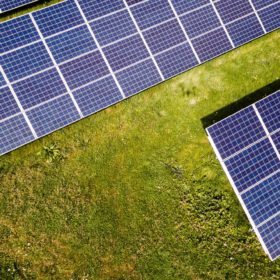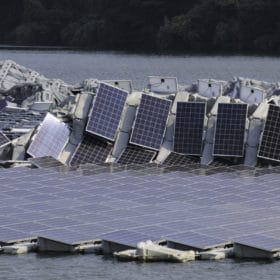International Solar Alliance launches programs on solar and battery waste management, green hydrogen
The International Solar Alliance (ISA), which aims to mobilize more than $1 trillion of solar power investment by 2030 in its member countries, expanded its scope of work by launching programs on solar panel and battery waste management and solar-powered hydrogen production in its fourth assembly held recently.
India and Australia’s richest race to net-zero by 2030
Today, both Reliance and Fortescue are realizing the huge investment, employment, import replacement and export opportunities in zero emissions industries of the future, both for India and Australia. And they look to be leading the way, fully supported by global financial institutions increasingly seeking to deploy trillions of patient capital in low volatility, non-commodity price exposed zero-emissions energy sources of the future.
Orsted’s transition shows the way for Indian utilities and renewable energy companies
Orsted transitioned from a coal-intensive utility to a global renewable energy leader creating immense shareholder wealth. A new report looks at what strategic decisions led to this transition and learning for Indian companies to look forward to the future energy transition.
Responsible land-use for solar, wind plants could smooth the path for India’s energy transition
India will require large swaths of land for the huge expansion of renewable energy capacity over the coming decades. The energy transition requires planning for proper siting of these plants and solutions like agrivoltaics, distributed energy systems, and offshore wind to reduce land-use conflicts.
UK to invest $1.2 billion in green energy projects in India
UK’s development finance institution CDC will invest $1 billion in green projects in India between 2022-26. Besides, UK has committed a new $200-million private and multilateral investment into the joint UK-India Green Growth Equity Fund that invests in Indian renewable energy.
The prospects for solar in a 1.5C world
We will need 10.7 TW of clean energy generation capacity this decade to stay on track with the most ambitious of the climate change paths agreed in Paris, which would include plenty of solar investment and jobs, according to the International Renewable Energy Agency.
Developing climate-resilient decentralized solar solutions
A new report states decentralized solar installations in climate-vulnerable regions of Assam, Jharkhand, and Rajasthan lacked design to deal with future climate risks. The report authors, based on their study, outline considerations for policymakers, implementing agencies, vendors, and funding agencies to build resilient structures.
Green taxonomy first step towards building a resilient society
The second wave of Covid-19 reminds us to build a resilient society. Climate Change, not unlike Covid-19, will deliver devastating effects to our planet and disrupt our way of life. So, in this climate decade, India must channel investments into sustainable activities. The first step is to construct a robust “green taxonomy” – a green list of sustainable activities.
India-US climate ties must prioritize green transition finance
A new report says the United States and India have an opportunity to partner to catalyze foreign institutional investment in India’s green transition. It lays out what such a partnership should look like and how it would benefit both countries and the world.
IndianOil selects American firm Dastur for India’s largest industrial carbon capture and utilization project
The CO₂ captured from the hydrogen generation units at Koyali refinery in Gujarat will be primarily used for enhanced oil recovery at the Oil and Natural Gas Commission’s oilfield at Gandhar, near Koyali.















